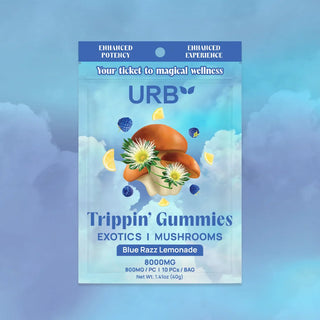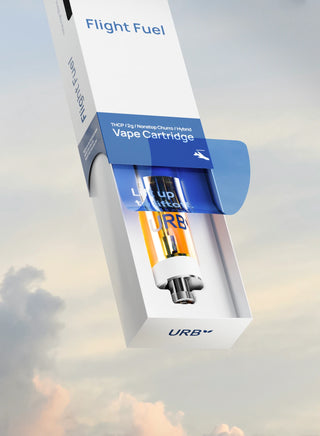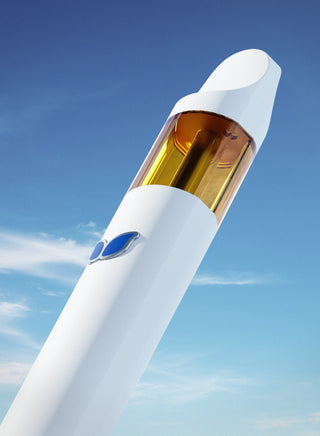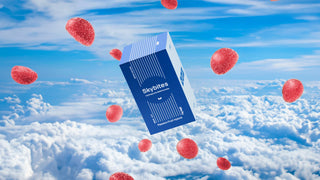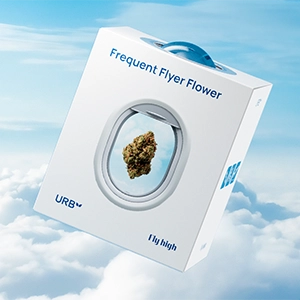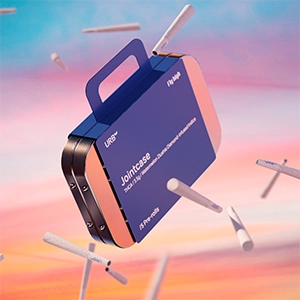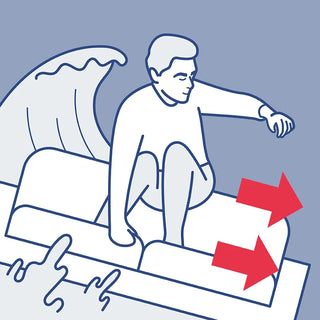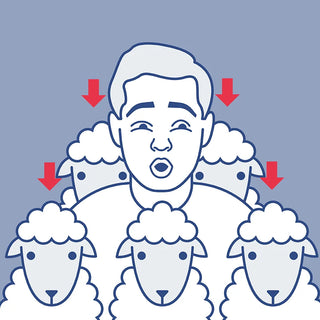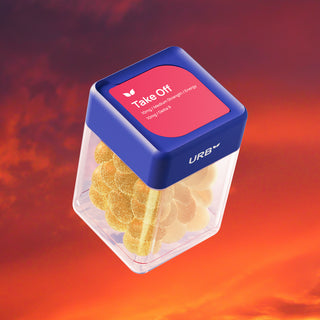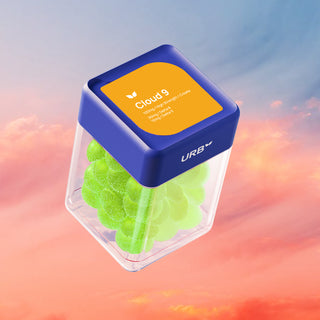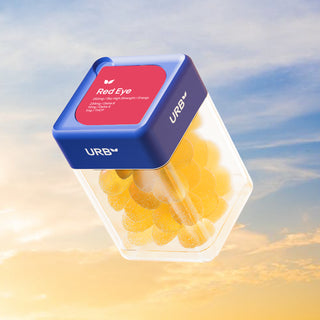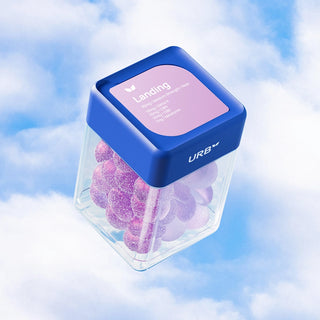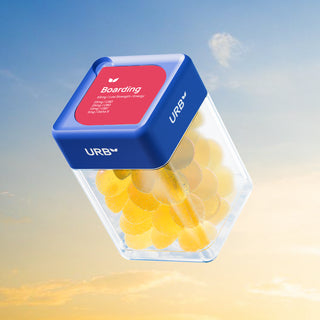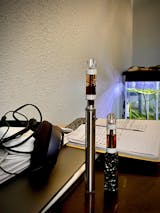You know THC, the superstar cannabinoid of the cannabis plant, and the most well-known since it’s responsible for those classic psychoactive effects. But what is THCA? The acidic precursor to THC, it’s actually what you’re more likely to find in cannabis and hemp. Though it doesn’t impart psychoactive effects by itself, you can think of it as the “essential ingredient” for making THC.
THCA at a Glance
THCA, or tetrahydrocannabinolic acid, is the non-intoxicating compound in raw cannabis that converts to THC when heated. That process—known as decarboxylation—is the essential step that unlocks all the psychoactive and other effects associated with the cannabis plant.
What Is THCA?
You may be familiar with THC as the major compound in cannabis, and the one that imparts the plant's classic effects. But THC is actually one of many—over 100—similar compounds called cannabinoids that these plants produce. And within this sphere, THCA plays a crucial role; without it, we wouldn’t have THC.

THCA (tetrahydrocannabinolic acid) is a naturally occurring cannabinoid found in raw cannabis and hemp. It is the precursor to THC. Unlike THC, THCA is non-psychoactive and non-intoxicating on its own. When it undergoes a process known as decarboxylation, which most often occurs when heat is introduced with a lighter, oven, or other source, it instantly converts THCA to the better-known, psychoactive THC.
THCA is formed within the trichomes, the tiny mushroom-shaped glands that appear as the silvery dust you see on cannabis flower. And THCA isn’t the only unique compound found in cannabis and hemp that is changed by heat. Like THCA, CBDA is the acidic precursor to CBD, and introducing heat will also convert CBDA to CBD. The same can be said for CBGA, CBCA, and so on.
You can think of these and other cannabinoids as the major “active ingredients” in hemp and cannabis, and along with other important compounds such as terpenes, they come together to produce the common effects and benefits we seek from these plants.
How THCA Becomes THC: Decarboxylation Explained
You can think of THCA as “potential” THC. To get from THCA to THC, it’s essential to understand the process called decarboxylation, whereby THCA is converted into THC when exposed to heat. This conversion happens instantaneously when cannabis is smoked or vaporized. If you’ve ever put a match to a bowl or a joint, you’ve already decarboxylated cannabis yourself.
However, decarboxylation also happens naturally on the molecular level when exposed to heat for longer periods of time, such as if a jar of flower is left in the sunlight on a windowsill.
Whichever way it’s triggered, decarboxylation removes an atomic structure known as a carboxyl ring, often denoted by the symbol “-COOH.” When it’s in place, that ring prevents THCA from binding with the CB1 receptors in our endocannabinoid system and producing the same effects as THC. Here’s the process, simplified:
-
Raw cannabis flower contains THCA.
-
Heat is applied through smoking, vaping, or baking.
-
This heat removes the carboxyl group (-COOH).
-
THCA then becomes THC, which is able to bind with our CB1 receptors and deliver the psychoactive effects we associate with cannabis.
Once you understand decarboxylation, the difference between THCA and THC becomes much clearer.
THC vs THCA: What’s the Difference?
Now that you know how THCA transforms into THC, it’s easier to understand why these two cannabinoids behave so differently in the body. THCA exists in raw cannabis in its non-intoxicating state, while THC is the active form created once heat is applied. That single shift—from “potential THC” to the fully active compound—changes how each interacts with the endocannabinoid system and the kinds of effects they produce.
To make the distinctions crystal clear, here’s how THCA and THC stack up across definition, structure, effects, and legality:
|
THCA |
THC |
|
|
Definition |
The non-psychoactive compound found in raw cannabis flower; the essential precursor to THC. |
The major psychoactive cannabinoid responsible for cannabis’s “high,” created when THCA is heated and decarboxylates. |
|
Chemical Structure |
Contains a carboxyl group (-COOH) that prevents it from binding to CB1 receptors. When heated, this group is released through decarboxylation, converting THCA into THC. |
Has already lost the carboxyl group through decarboxylation, enabling it to bind to CB1 receptors and produce psychoactive effects. |
|
Effects & Potential Benefits |
Non-psychoactive; currently being studied for potential functional properties, including the possibility of helping prevent certain metabolic diseases. |
Psychoactive; may support relief from chronic pain and other conditions. |
|
Legal Status |
Federally legal under the 2018 Farm Bill, provided hemp products contain <0.3% THC by dry weight. THCA qualifies because it is not technically THC. URB maintains compliance through strict lab testing and transparency. |
Federally illegal, even though many states have legalized it. Cannot be shipped or transported across state lines, limiting access in some regions. |
For a deeper dive, visit our dedicated guide: THCA vs THC.
THCA Effects and Benefits
What does THCA do? If you were to consume raw THCA bud without exposing it to heat first, you wouldn’t feel any psychoactive effects. Of course, this changes when THCA is converted to THC through heat. But on its own, early studies suggest THCA may have anti-inflammatory, memory-supportive, and potential anti-nausea properties. Because it’s non-psychoactive in its raw form, this makes it an attractive option for patients seeking symptom relief without the mental alterations associated with THC.
How does THCA make you feel? When it’s in its raw state, THCA won’t produce any intoxicating effects, though some consumers report a subtle sense of physical ease when consumed without heat. Once it’s been decarboxylated, however, the experience mirrors traditional THC, typically bringing on the familiar blend of relaxation, euphoria, and relief that many people seek from cannabis.
Is THCA Safe to Smoke?
If you have concerns that not enough is known about THCA to make it safe, let us help put it into perspective. As we’ve said above, when THCA is exposed to sufficient heat, it becomes THC. So if you’ve ever smoked or vaped cannabis, you’ve already consumed THCA safely. Plus, THCA itself is non-toxic and naturally present in the cannabis and hemp plants.

But beyond the question, “Is THCA safe to smoke?” it still raises valid concerns about cannabis and hemp products. No matter which cannabinoid you’re interested in working with, it’s essential that it be sourced from a retailer that performs third-party testing and provides clear certificates of analysis (COAs) to ensure purity and accurate potency.
At URB, that’s just something we do as a matter of course, and it’s one reason our lab-tested products continue to win awards, earn our loyal customers’ trust, and provide a smooth, safe ride each and every flight.
Does THCA Show Up on a Drug Test?
There are two ways to answer this, depending on how THCA is consumed. But for either one, it’s important to understand that once THCA has been decarboxylated, it produces the same metabolites—or biochemical by-products—as THC does. It’s these metabolites that drug tests are designed to detect.
-
If you’re consuming THCA in the form of raw cannabis flower, it’s possible, but not absolutely certain, that it will show up on a test.
-
If you’re smoking or vaping THCA, you're automatically decarboxylating it into THC, which is a different story entirely. In that case, it’s the same as consuming THC, and as the most current science suggests, it will likely show up on a test.
If you’re concerned about whether or not THCA or other cannabinoids will show up on an upcoming test, your best bet is to hold off on consuming cannabis or hemp products.
How Long Does THCA Stay in Your System?
The main types of cannabis drug tests analyze urine, saliva, hair, sweat, or blood samples; here are some rough detection windows for all of them:
-
Urine tests: Can detect cannabis for approximately 1 - 30 days after use
-
Saliva tests: Can detect cannabis for up to 24 hours after use, though this may extend up to 30 hours in some cases
-
Hair tests: Can detect cannabis for up to 90 days after use, though transfer of oils from skin to hair may trigger a false positive
-
Sweat tests: Can detect cannabis for 7 - 14 days
-
Blood tests: Can detect cannabis for up to 12 hours
For a deeper dive and guidance, visit our article on how long Delta-9 THC stays in your system.
Is THCA Legal?
THCA that is hemp-derived and contains 0.3% THC or less is federally legal under the 2018 Farm Bill. But THCA’s legality varies at the state level and may be restricted in some states. In cannabis-legal states, THCA derived from cannabis is legal, but even a few cannabis-legal states have enacted restrictions on the cannabinoid.
Because these regulations continue to evolve, what’s permitted today may shift as states update their hemp and cannabis policies. According to current DEA rules, THCA counts towards the total THC under what’s known as post-decarboxylation testing. If you need to know if THCA is legal where you live before ordering any online, it’s best to check with your state’s specific laws on cannabis.
Best Ways to Use THCA
If you already know and love THC, figuring out the best ways to use THCA shouldn’t be too hard. Here are some popular ways to access THCA’s effects.
-
Raw Use: In this state, THCA is non-intoxicating. Some people add raw flower, like URB's Premium Economy THCA Flower, to smoothies or tinctures for its potential anti-inflammatory and other effects.
-
Smoked/Vaped: Consumed this way, THCA converts to THC for the traditional range of effects. You can find it in our Jointcase pre-rolls and Aerodab 100 Jet Set disposable.
-
Edibles: When infused into baked goods, gummies, or other treats, THCA converts during the cooking process, delivering the same THC-forward experience you’d expect from traditional edibles. You’ll love it in our mouthwatering Gummy Getaway St. Lucia.
Whichever THCA formats you’re interested in, remember that it always pays to choose verified third-party lab-tested products like the ones we offer here at URB. Your health is paramount to us, and we want to support your safety as you explore the world of THCA products.
Fly With Urb and Enjoy First-Class THCA
Intrigued? You’re in luck. We invite you to try our premium high-THCA products in multiple strains cultivated here in the US under ideal growing conditions. It’s the perfect way to access all the delightful benefits of THCA from a brand you can trust.
Ready to experience premium THCA flower? Explore our award-winning URB collection and discover new ways to elevate your experience—always lab-tested, always top shelf. Better yet, become a Frequent Flyer with the URB Mileage Loyalty Program.
FAQs About THCA
What is THCA and how is it different from THC?
The main difference between THCA and THC is that THCA isn’t intoxicating, while THC is. But when THCA undergoes the reaction known as decarboxylation (the application of heat), it becomes psychoactive THC.
What does THCA do?
As the precursor compound to THC, the principal intoxicating compound in cannabis, THCA isn’t psychoactive on its own, though THCA benefits may include anti-inflammatory effects. When heat is applied to the cannabinoid, THCA transforms to THC.
Is THCA safe to consume?
While it's still being studied, THCA is generally regarded as safe to smoke. However, it’s crucial to purchase it from trusted sources such as URB, as we use transparent sourcing and production methods, and make our Certificates of Analysis (COAs) freely available.
Can THCA show up on a drug test?
Yes. Though THCA and THC are different compounds, THCA transforms in the presence of sufficient heat into psychoactive THC, the compound that drug tests are designed to detect. Therefore, any THCA consumption is likely to trigger a positive drug test result.
How long does THCA stay in the body?
That depends in part on what kind of test is used to detect it. While many drug tests rely on blood or saliva—which can detect THC metabolites for up to about 24 hours—some drug tests are effective up to 30 days.
What are the best ways to use THCA?
THCA is available in several different formats, including flower and pre-rolled joints, THCA gummies and other edibles, as well as vape pods and THCA disposables.
Is THCA legal in my state?
Thanks to the 2018 Farm Bill, raw cannabis or hemp compounds that contain 0.3% THC by weight or less are federally legal. Because THCA isn’t THC, this allows it to be sold in states that permit hemp sales. That said, some states prohibit the sale of all hemp products. If in doubt, check your local statutes for guidance.
